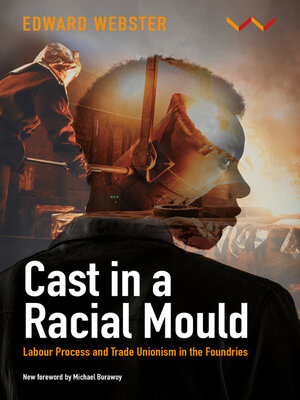
Sign up to save your library
With an OverDrive account, you can save your favorite libraries for at-a-glance information about availability. Find out more about OverDrive accounts.
Find this title in Libby, the library reading app by OverDrive.



Search for a digital library with this title
Title found at these libraries:
| Library Name | Distance |
|---|---|
| Loading... |
First published by Ravan Press in 1985, Cast in a Racial Mould was a pioneering book. It is now republished by Wits University Press with a new foreword by Michael Burawoy and with support from the National Institute for the Humanities and Social Sciences. Entering what Marx called 'the hidden abode' of capitalism – the labour process – this book analyzes the nature of work and worker resistance in the metal industry which lies at the core of South Africa's manufacturing industry. In an introductory chapter Webster points out that most studies of the labour process have neglected worker resistance. He challenges Braverman's depiction of mass production as a juggernaut which inherently imposes progressively tighter controls on workers, and points to two forms of worker resistance which have been important in the history of South Africa's foundries. Discussing the first of these in Part I, he shows how resistance to deskilling on the part of white craft moulders gave rise to a distinctive racial hierarchy of control in the foundries. Using race as a last line of defence against machinofacture's assault on their craft privileges, the white moulders effectively became supervisors of semi-skilled black labour. The collapse of this form of control was precipitated by the rise, in a South African foundry context, of the second form of resistance – increasingly confident bargaining by black semi-skilled workers in the wake of mechanization and the emergence of independent black unions. This is the focus of Parts II and III of the book. The onset of popular struggle in the townships from 1976 onwards forced the state, through a process that began with the Wiehahn and Riekert commissions, to embark on an attempt to incorporate black unions in a deracialized industrial relations system. Webster analyzes the interplay between the transformation of the labour process and the crisis in the system of racial capitalism as a whole to show how worker organizations, in resisting the state's incorporative strategy, have begun to develop a working class.|First published by Ravan Press in 1985, Cast in a Racial Mould was a pioneering book. It is now republished by Wits University Press with a new foreword by Michael Burawoy and with support from the National Institute for the Humanities and Social Sciences. This seminal work delves into the complex dynamics of labour relations and worker resistance in South Africa's metal industry, a crucial sector of the country's manufacturing base. Drawing on extensive research, the book challenges Harry Braverman's traditional view of mass production as an unstoppable force of worker control. Instead, it reveals two distinct forms of resistance that shaped South African foundries: white craft workers' resistance to deskilling and black workers' emerging collective bargaining power. Eddie Webster meticulously traces how white moulders used racial hierarchy to preserve their craft privileges, effectively becoming supervisors of semi-skilled black labour. However, this system faced unprecedented challenges with the rise of independent black unions and increasingly assertive black workers. The study particularly examines how township struggles post-1976 forced state reforms through the Wiehahn and Riekert commissions, attempting to incorporate black unions into a deracialized industrial relations system. This compelling analysis interweaves labour process transformation with broader critiques of racial capitalism, demonstrating how worker organizations resisted state incorporation while developing a distinctive working-class consciousness.







